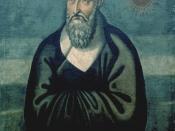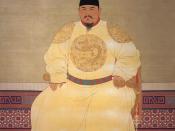Monkey, was originally published anonymously by Wu Chengen resulting from informality present in the text, and its lack of Classical Chinese. Published in the vernacular during the highly formal Ming dynasty, this would have defaced the image of Wu Chengen, a highly distinguished scholar. Resulting from the rise in the merchant and middle class in literacy, in conjunction with the printing press; Monkey has become a highly acclaimed Chinese classic that has been enjoyed for generations. Due to translation by Arthur Waley this novel has become available to English-speaking people, which further allowed the distribution of this commended text. When reading this novel, one would recognize its superior structure in incorporating Buddhist values in a tale of folklore and adventure that allowed this novel to be popular to survive generations and to be translated into many languages.
The author of Monkey, Wu Chengen throughout the story tries to instill upon the reader moral values of following Buddhism, piety and respect.
Although, when reading this novel, the reader gets a sense that the story is merely a fictitious story of adventure. In the 1500's when Monkey was written this book was intended for the literate common class of peasantry, who took delight in such tales of adventure and worship. In contrast, the noble class did not have immense interest in such works due to their upbringing, which focused more upon formal works of literature and Classical Chinese works. This formality developed during the Yuan period in China influenced the writing of the novel, as it preaches Buddhism as the way of life.
Wu Chengen's point of view is biased as he was an acclaimed Buddhist scholar in China. This influenced the ways that he viewed other religious beliefs and his point of view of other civilizations. Also, Chengen made...


